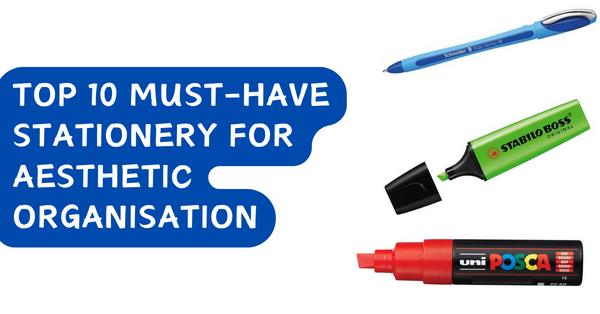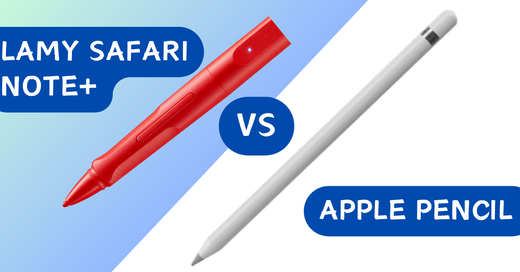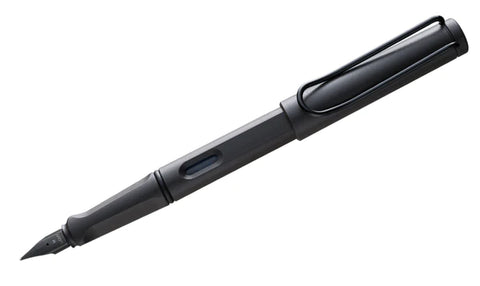How to Select the Perfect Pen Based on Writing Style and Grip Preference

Choosing a pen might seem straightforward, but when you consider factors like writing style, grip comfort, and the type of writing you do, the process becomes more nuanced.
Finding the perfect pen can improve your writing experience and even your handwriting itself.
This guide breaks down the main elements to consider when selecting a pen, helping you find one that matches your writing style and grip preference.
1. Understanding Your Writing Style and Purpose
Before diving into the specifics of pen types, let’s explore how different purposes and writing styles might impact your choice.
Everyday Note-Taking
If you’re taking notes throughout the day, you’ll want a pen that’s comfortable to hold for long periods and has a consistent ink flow.
Ballpoint pens and gel pens are popular for this purpose, as they tend to be smooth and easy to control.
Gel pens, in particular, offer rich, vibrant colours without the need for much pressure, which can reduce hand strain.
Calligraphy and Decorative Writing
For those interested in calligraphy or decorative styles, a pen with a flexible nib is ideal.
Fountain pens with italic or stub nibs create variations in line thickness depending on pressure, making your writing look more artistic and dynamic.
Sketching and Drawing
Artists who sketch or add illustrations to their notes often prefer fine-liner pens.
These pens have precise tips that allow for fine detailing, while brush pens provide shading options and can be used for calligraphy or free-flowing line art.
2. Grip Types and Their Impact on Comfort
Grip comfort is crucial, especially for longer writing sessions.
Choosing the right grip style can prevent fatigue and improve your overall writing experience.
Here are some of the common grip options available:
Ergonomic Grips
Many pens are designed with ergonomic grips, often made of rubber or soft-touch materials that mould to the fingers.
These pens provide comfort for extended use and are ideal for people who write a lot.
Ergonomic grips also tend to prevent hand fatigue, which is useful for students, writers, or professionals who take notes regularly.
Triangular Grips
Triangular grips guide fingers into a natural position, enhancing control.
This shape can benefit younger writers or those who struggle with consistent grip pressure, helping reduce slippage and improve handwriting quality.
Rubberised or Textured Grip
A rubberised grip or a textured finish can add extra traction, helping users maintain a firm hold on the pen.
This grip style is especially useful for people with sweaty hands or anyone prone to grip fatigue.
3. Pen Types and Ink Flow Options
Selecting the right pen type is essential to match the ink flow and writing pressure to your style.
Ballpoint Pens
Known for their durability and convenience, ballpoint pens are filled with oil-based ink that dries quickly and is less likely to smudge.
Ballpoints require more pressure to write, making them a good option for those with a firm writing style.
They’re ideal for everyday note-taking and are generally affordable and widely available.
Gel Pens
Gel pens offer a smoother writing experience with vivid, water-based ink.
They require less pressure than ballpoint pens, so they’re easier on the hands over long periods.
Gel pens are well-suited for detailed writing, journaling, and color-coded note-taking, but they may smudge if not allowed to dry fully.
Fountain Pens
With a rich, classic writing experience, fountain pens come in various nib sizes that accommodate different writing styles.
The ink flows with minimal pressure, making fountain pens great for users who prefer a light touch.
Fountain pens are ideal for calligraphy, long-form writing, and for users who appreciate elegant penmanship.
Rollerball Pens
Rollerball pens use water-based ink, similar to gel pens, offering a fluid, smooth writing experience.
They require less pressure than ballpoints but more than fountain pens.
Rollerballs are popular for both business writing and personal journaling, as they strike a balance between practicality and style.
Learn about the differences of rollerball vs ballpoint pens.
4. Consider the Weight and Balance of the Pen
The weight of a pen can significantly impact your writing comfort.
Some people prefer a heavier pen because it requires less pressure from the hand, while others prefer a lighter pen for its ease of movement.
Here are some pointers on pen weight and balance:
Heavier Pens
Ideal for those who write with a lighter hand, as the pen’s weight helps apply pressure to the page naturally.
Heavier pens can feel luxurious and may be easier for people with larger hands to control.
Lighter Pens
Suitable for fast writers or those who prefer quick movements.
Lighter pens can prevent hand fatigue over long sessions, as they require less effort to lift and move across the page.
Finding a balanced pen (one that doesn’t feel lopsided when held) is also important.
A well-balanced pen will naturally feel stable in your hand, allowing for smooth, controlled strokes without causing strain.
5. Experimenting to Find Your Perfect Pen
Ultimately, finding the right pen for your writing style and grip preference is a process of experimentation.
Here are a few tips to help you discover your ideal pen:
Try Various Nib Sizes and Shapes
If you’re new to fountain pens, start by trying different nib sizes to see what feels best.
Some people prefer finer nibs for precise lines, while others enjoy broader nibs for more expressive writing.
Test Different Inks
For fountain and rollerball pens, the type of ink can influence the writing experience.
Experiment with different ink colours and brands to see which one flows best for you.
Consider the Length of Writing Sessions
For those who write intermittently, weight and grip might be less of a concern.
But if you write for extended periods, prioritise comfort with features like a rubberised grip or ergonomic shape.
Experiment with Writing Angles
Some pens work best at specific angles.
For example, fountain pens require a particular angle to maintain ink flow, whereas ballpoints and gel pens are more flexible.
6. Top Recommendations Based on Style and Preference
Finally, here are a few general recommendations to match pen types to different styles:
For Fast Writers
Consider gel pens or lighter ballpoint pens with quick-drying ink to avoid smudging.
Suggestion: Pilot G-TEC-C4 Rollerball pen
For Artists and Calligraphers
Look into fountain pens with a flexible nib or fine-liners for detail.
Suggestion: LAMY Safari Fountain Pen
For Journalers and Note-Takers
Gel pens or rollerball pens offer a smooth flow ideal for detailed work, especially if you enjoy using colours.
Suggestion: Pilot Frixion Clicker Erasable Rollerball Pen
For Handwriting Improvement
Choose a triangular or ergonomic grip to aid control and form.
Suggestion: Staedtler Triplus Ball Pen
Conclusion: The Perfect Pen for You
Selecting the right pen is a personal process, but by focusing on writing style, grip preferences, and experimenting with different options, you can find one that feels just right.
Whether you’re a casual note-taker, an artist, or someone who simply enjoys a comfortable writing experience, the right pen can make all the difference in how you express yourself on the page.
Also in Guides

Top 10 Must-Have Stationery Items for Aesthetic Organisation
Discover the top 10 must-have stationery items to elevate your organization game. From premium pens to stylish notebooks and highlighters, this guide features the best tools for an aesthetically pleasing and productive workspace.

LAMY Safari Note+ vs Apple Pencil
Two prominent contenders stand out for digital writing instruments for iPad users: the LAMY Safari Note+ and the Apple Pencil. This comparison delves into the advantages and disadvantages of the Apple Pencil and LAMY Safari Note+.

Exploring the World of Eco-Friendly Stationery
Switching to eco-friendly stationery is a simple yet impactful choice that contributes to sustainability. By choosing products like refillable pens and highlighters made from recycled materials, we’re not only reducing waste but also supporting brands that prioritise environmentally friendly practices.





